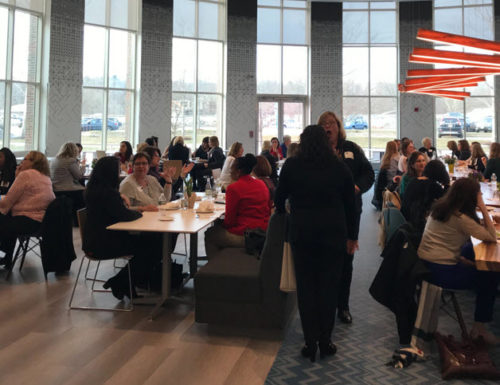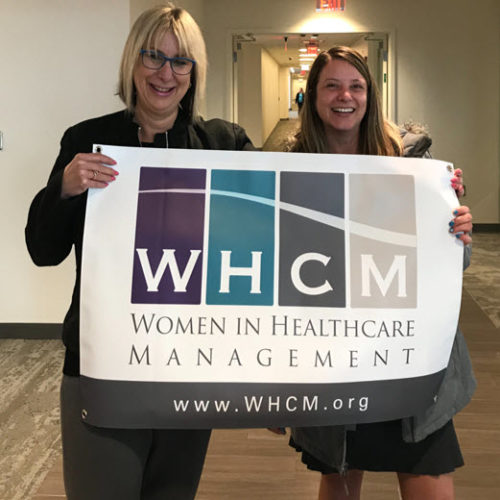Professional Development Is Your Gift to Yourself
Knowledge is your competitive advantage. In today’s challenging global economy where the most valuable asset is your knowledge, education is no longer just a pathway to opportunity – it is a prerequisite. As the economy continues to grow, companies need employees who can think critically, successfully manage change, and apply new skills using more complex technologies. Simultaneously, organizations must continue to improve the way they do business, retain and manage their talent pool, and apply new best practice models quickly in order to remain competitive and sustainable.
We know that change is constant. As a result, the need for a knowledgeable workforce – one that is best prepared to compete in this economy – is in demand. Acquiring new knowledge, learning new skills and applying new techniques can help you master the challenges of change and enable you to be more effective and innovative. Increased competence improves confidence, and begins when you take the first step, investing in your education.
Innovative Healthcare Leadership Certificate (Online Only)
Healthcare today is a complex, technical business that is rapidly evolving. Healthcare leaders not only need to stay current with medical and technological advances; they also need to develop the skills to successfully navigate the shifts from a more traditional fee-for-service business model to new patient-centric, team-based care. It’s critical that today’s healthcare leaders acquire the skills to navigate the medical, technological, economic and social factors driving these system changes, to effectively shape and positively influence the future of our healthcare system.
Certificate and/or certification programs are also another way to stay relevant in the workforce. Certificate programs may lead to designations and are registered with national and international certifying organizations. Certificate programs teach to a body of knowledge that may satisfy the educational requirements for various certifications. Examples of certificate programs are:
- Innovative Healthcare Leadership*
- Reengineering Healthcare – Healthcare Quality Process Improvement
- Business Process Management
- CyberSecurity
- Design Thinking
- Business Analyst
- Human Resources
- Project Management
- Supply Chain Management
Today’s professionals need flexible solutions that fit their busy schedules, global work environments and preferred learning style. Learn online, anytime, anywhere, when the time is right for you!
To register or learn more about Bryant University’s online Innovative Healthcare Leadership Certificate, contact: Jocelyn Willis, Business Development Manager | 401.232.6249 | jwillis2@bryant.edu
*Scholarships may be available for next enrollment on January 7, 2018.
Submitted by WHCM Steering Committee Member Jocelyn Willis




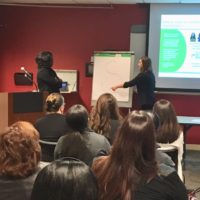 leveling off again. You want to think about your next career step before you are ready to make your next move – this puts you at an advantage. They discussed words to use on your resume like ‘earned’, ‘saved’, ‘achieved’ and how what keywords you choose in your bio and on LinkedIn can help you shape your brand. Laura took the brand discussion one step further and linked it to interactions and networking. Whomever you are talking to is your “target audience” – you can build a communication bridge by finding common ground – pets and kids are usually good places to start. Think about the “so what” – you have XYZ as a strength, but what does that mean to the person you are talking to?
leveling off again. You want to think about your next career step before you are ready to make your next move – this puts you at an advantage. They discussed words to use on your resume like ‘earned’, ‘saved’, ‘achieved’ and how what keywords you choose in your bio and on LinkedIn can help you shape your brand. Laura took the brand discussion one step further and linked it to interactions and networking. Whomever you are talking to is your “target audience” – you can build a communication bridge by finding common ground – pets and kids are usually good places to start. Think about the “so what” – you have XYZ as a strength, but what does that mean to the person you are talking to?


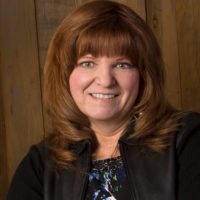
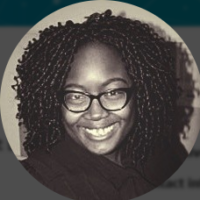 Busayo Ola Ajayi, MS, SCP, SPHR, Director, Talent Acquisition, Diversity and Inclusion at Boston Medical Center (BMC)
Busayo Ola Ajayi, MS, SCP, SPHR, Director, Talent Acquisition, Diversity and Inclusion at Boston Medical Center (BMC) Kaylee Davis, Addison Group
Kaylee Davis, Addison Group elastic band and being lost on an island. But I digress. Here, I reflect on my motherhood journey in the past 11 months.
elastic band and being lost on an island. But I digress. Here, I reflect on my motherhood journey in the past 11 months. Join Women in Healthcare Management as we visit a beautiful new summer networking location on Boston’s waterfront. Included are passed and station hors d’oeuvres. Munch on delicious items like lobster sliders and chicken satay as you enjoy summer in Boston; all while making new connections and seeing old friends. We will also feature a mini dessert station with coffee. Cash bar. Hope to see you there!
Join Women in Healthcare Management as we visit a beautiful new summer networking location on Boston’s waterfront. Included are passed and station hors d’oeuvres. Munch on delicious items like lobster sliders and chicken satay as you enjoy summer in Boston; all while making new connections and seeing old friends. We will also feature a mini dessert station with coffee. Cash bar. Hope to see you there!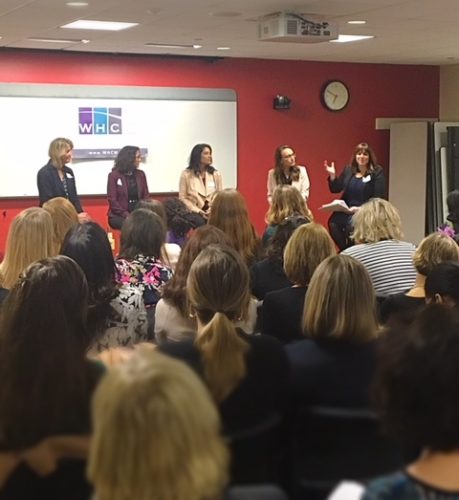 There was a record turnout at WHCM’s Spring Event March 28, 2018, as nearly 100 women from a variety of health care sectors attended for what was clearly an important and timely topic “Health Care Innovation: How Market Players are Shaking Things Up and the Impact on Your Career.”
There was a record turnout at WHCM’s Spring Event March 28, 2018, as nearly 100 women from a variety of health care sectors attended for what was clearly an important and timely topic “Health Care Innovation: How Market Players are Shaking Things Up and the Impact on Your Career.”